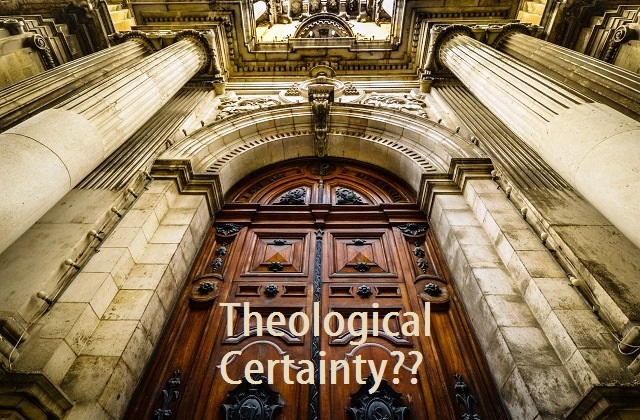The illusion of theological certainty has to be one of the greatest hindrances to spiritual wisdom and the main perpetrator of the divisions in the Body of Christ. It was 30+ years ago now that The Lord Jesus Christ revealed himself to me and I surrendered to serve Him in the gospel ministry.
Our family was involved in many church starts, including the first Hispanic church in Jacksonville. All of these began well, I thought, but after a few years the relationships and love which birthed them settled into a dry and boring weekly ritual.
When the Lord called me to my first and only pastorate, it was a logical progression of a return to love, relationships, and what I thought was the pure way. We didn’t know much, but we were grateful for our salvation. We wanted to love Him and love His people.
We did fairly well in the beginning, but the compulsion to be accepted by other Christian leaders and my own flock led me to get two Masters degrees from a seminary. Also, the need for financial assistance brought us into a relationship of convenience with a denomination. They needed numbers, and we needed financial support.
Those decisions caused us to depart from the backbone of love upon which our church family was founded. We traded “higher” new goals in the name of success.
For 16 years we hammered at achieving theological agreement based on biblical certainty. It never happened! It didn’t happen overnight, but we definitely lost “that loving feeling” that was so much a part and, I would even say, the very foundation of our roots.
Today I am a global Christian internet Equipper of sorts. What I teach is based on years of experience and conviction that the Father has molded in me while serving all kinds of Christian circles. Today I know full well I could be wrong, not because I am ignorant, but because the Holy Spirit has not yet revealed some things to me. That reality has moved me away from the illusion of theological certainty and focused me again on the verse:
John 13:35
35 By this all will know that you are My disciples, if you have love for one another.”
Please do not deceive yourself. If love and relationships are not your priority you are in the camp following the illusion of theological certainty and trying to call disciples after yourself in the name of Christ.
The following was written by my brother Steve Crosby. Below are the reasons for the illusion of theological certainty. JLB
Vagueness in Scripture
When, after 2,000 years of the totality of human Christian experience, there is no agreement on difficult or obscure passages of scripture, there is nothing definitive to be had, only perspectives and possibilities. We are free to agree with or ignore them, or to come up with our own to add to the sauce. To quote Dr. Gordon Fee: “It’s all hermeneutics (interpretation).”
Believing that through my disciplined study or “Holy Spirit download revelation” that I will: a) come up with something that 2,000 years of Christian humanity has not figured out before I arrived on the scene, or b) that what I think I understand will be better or more accurate, is a troubling and arguable idea. I realize that Protestantism would not exist if some did not take these for granted as unquestionably true. In Restorationist[1] circles in which many Evangelicals have been raised, it is practically a fetish. I believe that even a little honest consideration on the proposition—the pride and arrogance of it all—should cause some self-reflection.
Protestants, Fundamentalists, Evangelicals, Charismatics, all think the certainty of the Pope has been replaced with the certainty of the Bible. Not really. We are inescapably left with not the certainty of the Bible, but the certainty of the interpreter/s of the Bible: whomever or whatever that might be. (Forgetting for now that the Bible many evangelicals in the West are certain about did not exist until 1825.). Hence there are 10,000-35,000[2] different Protestant denominations, each professing clarity on the Bible, and claiming certainty for their point of view. This is logically absurd. Obviously, somebody has to be wrong, yet they all claim to be certain because we now have the “perfect Bible.” Their very existence proves definitiveness is not possible on many issues.
We all have methods of thinking, feeling, analyzing, measuring, judging, accepting, and rejecting. We want to know if something is true, right, and good. But the absence of costly love in that sentence should alarm all of us. The methods we have been trained to use to arrive at those things are deeply flawed, ungodly, un-Christ-like, and pagan.
It does not necessarily follow that just because something is in the scripture, that absolute clarity is something we should always reasonably expect on everything contained therein. Our intellectual heritage—natural and spiritual—has conditioned us to approach the scriptures from a paradigm of humanistic rationalism. It is difficult for us to see how handling the scriptures this way prevents us from accepting and loving others, especially those with whom we differ or deem not worth our time. But It does. Like spiritual body odor: we can’t smell it on us, but others surely do.
Why such focus on the clarity of scripture (doctrine) and the downplaying of love? This is one of the great sins to come out of the Reformation. It is in the Protestant bloodstream. Why do we not have the same passion for loving well as we have for “truth and purity”? Why is loving well not the all-consuming passion, greater than everything else? John said that if we do not love others, we do not know God. Period. Why all the angst over secondary and peripheral issues? It does not lead to loving God or others well.
Certainty is an illusion. Only God can be 100% certain in all things (fully objective), therefore, to claim certainty because we now have the Bible, is to claim god-likeness, and it is sin. The rest of us are all interpreters in some way. We see in part. We approximate. Only God can be certain. The Jews had deep convictions about the scriptures, and they were wrong. Jesus came (in part) to correct their faulty hermeneutics and their understanding of God they derived from scripture. (John 1:18). They were certain. They were wrong. It cost Jesus his life.
Fundamentalism suffers from the same disorder. We all are free to hold sincere convictions based on what we think we understand at a given moment, based on the degree of light we have at the moment, as the gift of God to us. But that is not the same as philosophical certainty, definitiveness, or clarity. It is just what I think I may know at the moment, nothing more. No condemnation if I am wrong, but also no boast of certainty if I am right.
Perfection—the “perfect,”—certainty—definitiveness—is a non-Jewish, Greek philosophical construct. It is directly downloaded from Plato. It was injected into the bloodstream of Western Christianity from the beginning, and into Protestantism from the womb of, toxifying it to this day. Even if the Bible is considered “perfect” in a Greek abstract and metaphysical way (a concept I do not accept), no one reading it is perfect! Therefore, certainty is an impossibility, and we are all just interpreters doing our best—sometimes better than others. Honorable followers of Jesus can, and have come to, different conclusions on many things in the Bible.
Vagueness is divinely built into the scriptures on many secondary issues. This is so we do not worship our certainty as God, and so we learn to have relational trust (faith) in the Only One who can be certain in all things, and to walk humbly with him—more humbly than we may ever have imagined. Jews (Jesus and Paul, et.al.) understood and were content to live in the realm of vagueness: “could be” and “might be.” The Rabbis had four levels of understanding the scripture, and the literal was considered the least significant, the shallowest!
- Peshat – the literal meaning
- Remaz – the suggested meaning
- Derush – investigative meaning
- Sod – the allegorical or revelational meaning
Western European rationalists have great unease with this uncertainty: a multi-layered construct of different possibilities!
If we have clarity, we do not need faith (relational trust—that which provides rest and wellness of soul) because “we’ve figured it out.” We are now gods. We have the answer/s. We know good from evil. We know right from wrong, because “we have the Bible,” and our faith is in our clarity, not God in His Person. This is the primal sin, the wrong tree in the garden. The scriptural text is meant to be engaged like a Jew would: in dialogue with living beings—God by His Spirit, and the ekklesia. It is not meant to be studied and pursued for mastery, regardless of the bad rendering of 2 Tim. 2:15 (http://stevecrosby.org/doctrine/studying-the-bible). Having clarity is like saying you have mastered something, that after long effort and journey we have arrived at the answer! No, we all just see little bits, now and then.
We cannot know God that way. He will not submit Himself to our need for clarity. Doing so would be role reversal. We become master and He becomes the heavenly gift machine providing us with clarity if we just work hard enough at getting it. In doing so, we remain slaves to our need for clarity.
Struggle, not clarity, is the kingdom way. It forces us into relational trust and dynamic relationship with living beings: God and others. The compulsion to provide understanding so the hearer can come to a self-satisfying sigh of relief is a European humanistic construct. Jesus did not strive to be clear nor understood. More often than not, Jesus spoke in cryptic parables and was content to let some hear, some not hear, let people be offended, let them leave, and have almost everyone struggle with what he said, and even motivate his hearers to murder! (Luke 4). That is definitely, not clarity!
We enter into a text as a way of entering into and experiencing God’s heart of love for myself, the church, and the world: not so I can master the content or get clarity on an issue. We agonize, (literally) wrestle, with a text and potentially not come away with a satisfactory answer or any answer at all! The process is the outcome. It is the Jewish way, and the kingdom way, the Jesus way.
All the great minds through the generations understood this: Aquinas, Kierkegaard, Luther, Calvin, Barth, the mystics, the monks, the Fathers of antiquity–they all understood this. They all expressed doubt and uncertainty about the text at different places: any honest exegete would. They all expressed that they lived in uncertainty in one way or another, yet they had confidence in the scriptures.
How is this redemptive?
Imagine a dot on a balloon representing what I know, and the rest of the balloon representing what I do not know. If I blow the balloon up, what I know increases, but what I don’t know increases exponentially more. A lack of clarity is the kingdom norm, even on the things that we think are clear-cut. If it was not so, our understanding will be our God (God is subordinate to our mind), and we will be nasty people, like some fundamental Evangelicals are in their clarity and certainty about the Bible.
It has to do with real humility and pulling me out of my delusion that I have a grasp on the throttle of the universe or, the Bible. I don’t. It keeps me from being a know-it-all-jerk, with an anxiety and insecurity-based need to inform people of this or that. It keeps me “submitted under the mighty hand of God.” As the content of my understanding increases, so does my lack of clarity. I know less as I know more. This is a lifetime of vagueness and submission under the hand of God. This is a mystery of Godliness. This actually honors the scripture and elevates it over my intellect!
The scripture is not a book of topics and principles that I master with understanding. The Bible is not a chemistry book of objective formulae. That is what the Reformation taught rather than a Jewish perspective. Here’s the narrative that came out of European scholasticism during the Reformation, created in reaction to out-of-control Catholic mysticism:
- God is a rational being.
- The scriptures are the manifestation to us of His mind (His principles).
- Therefore, the scriptures, as the manifestation of the mind of God, must themselves be rational.
- Therefore, if I exercise rational study and study tools in the scripture, and if I obey rationally, I will have proper, exact, certain, knowledge of God, not needing nor relying on any authority figure (i.e. Pope).[3]
The expectation was that if you treat the Bible as you would any other piece of classical literature from antiquity, with rational discipline of thought, that you would avoid the excesses of extra-curricular Catholicism. That is the way to study a college textbook, not the scriptures. Even Luther knew that was not enough! (I do not think he would recognize the fundamentalist literalism that came after him in his name!)
That is not how you engage a living being. God will not be objectified by us in that way. He is not the object of our study. I approach the scriptures as the mind of the living God to master me. I should be in over-my-head all the days of my life. We may never get clarity on many secondary issues. If we would know God, we must enter the door marked God, with all its uncertainties, not through the door marked “the knowledge of God.” We have been trained for the latter, and feel uneasy about the former because it is not clearly defined.
What then? Is it a cosmic free-for-all? No. The essentials have been defined for us for almost two thousand years! We are not the first to have walked this way! We do not have to reinvent the wheel: Jesus, born of the seed of David, crucified and resurrected bodily, is Lord, and coming again—short version of the Apostle’s Creed! As believers we commit to that in confidence. The rest is all interpretation, not metaphysical certainty.
Truth is a person with a beard in ascended resurrected and glorified humanity. He cannot be reductionistically reduced to a series of propositions from a book, and the correct and certain understanding and application of those propositions. The book points us to Him. Jesus is the truth. That is enough for us to confidently put our trust. Uncertainty can abound elsewhere, especially on eschatological things, in which the writer himself (Paul or whomever) developed progressive thought and understanding rather than a static perspective of “got it.”
We have assured and reasonable confidence (trust–not certainty) based on the apostolic testimony recorded for us in scripture concerning the person and work of Jesus–enough to put our relational trust in both the testimony and the person. That is all we need. We don’t need certainty or clarity on peripheral and secondary issues. We can Midrash[4] them like a good Jew would.
We are free to hold our convictions on secondary things–with love and charity toward others. But–with an open palm, not a clenched fist, and without coercion toward others! We do not build an altar or idol around them, nor demand others conform to our perspectives on secondary and peripheral issues (Eschatology, hell, authority, government, church structure, angels, demons, etc. The list is endless.).
Jesus alone is worthy of being held with a clenched fist. Nothing else is worthy—including our understanding of the Bible. As Lord He has the right, even the demand, to knock everything out of our palm—even the “right things.” An open palm is the invitation to freely crucify everything I think I have learned and upon which I think I have clarity from the Word, especially when the things I am passionate about become oppressive, not life-giving to others.
Jesus was often pursued for clarity: something definitive, something objective. He rarely obliged. For example:
“Master, what do I have to do to inherit eternal life?”
That’s a simple question—looking for a clear and definitive answer. On the surface this appears to be quite an honorable and reasonable request. We should always clearly answer that right? It is our duty unto God to provide everyone with a clear answer, right? No, not right. He gave three different answers to the same question to three different people![5] Very Jewish of Him! And, He shaped His response based on their heart condition and what it was that was uniquely stumbling the person in front of him, preventing them from apprehending the kingdom! That will not fly in rationalistic Biblical fundamentalist evangelicalism. It is not a simple blueprint answer.
He rarely answers those questions. Why? He recognizes the: “Give me a definitive answer so I know what I am obligated to do to meet God’s expectations” spirit, behind the question. He will resist that. “I don’t know,” or “I am not sure,” or “there are different possibilities for this,” are all completely satisfactory responses to questions. Withholding truth from someone is a completely legitimate response to questions. Purposefully confusing people is a completely legitimate response to questions. Purposefully making things difficult to understand, rather than clear, is something Jesus routinely did. Jesus did all of these! Jesus often left people with no clarity! Consider his deepest life teaching in John 6! Not only did He not provide clarity, He made them literally nauseous![6]
The Cruciform Life
The essence of the crucified life is not the elimination of the “bad stuff” in our life. It is not the loss of material things. It is letting go of the dear things—our very hope and confidence in the things we think we understand about God from the scripture—the things we are deeply invested in, the things we have given our literal life blood and essence, the living thing, the thing that brings us life, the thing that we are SURE (certain) that God has given us. We voluntarily kill them, and release them into the hands of the Lord of resurrected life who may, or may not, ever raise them up, until we are left with nothing and no opinions other than Him, and love for him and others.
Death and resurrection is the message of Abraham taking Isaac up Moriah. Talk about life’s blood and investment and promise and hope for the future—all God-given! Kill everything your hope is bound up with. Kill even God’s promise to you and your hope of its fulfillment. God says: You must freely kill it and then . . . believe in the God who raises the dead, including your dead hope.
Death and resurrection is faith: relational trust. It is the kingdom way. I trust Him and I am good with either: just death, or death and resurrection. Why? Because I trust Him and I trust Him (faith) to bring life out of death as the only sanctified and fruitful way of living and ministry, if he determines to do so.
Passion for Truth
But some might say: “I am just passionate for truth and for others to know it.” Passion for truth is one of the identifying markers of the conspirators to crucify Jesus (among other things)! That is why they crucified Him (Rome conspired for other reasons)! Their zeal for truth and purity led them to kill The Truth. In addition for a passion for truth, the crucifiers of Jesus possessed these qualities:
- Passion for purity, hating compromise – – the Hasidim, the pure ones, the Pharisees
- Zeal – for God and his house and his people – the zealots
- Conviction of certainty about scripture and a conservative interpretation – Pharisees
- Passion for justice – zealots, Essenes
- Passion for righteous government – zealots, Maccabees: get rid of Rome
It is not enough to merely be passionate for truth. If these “virtues” are in us, is it not worthy of reconsideration emotionally, spiritually, theologically, and practically? Does it not shake us to our core to see the similarity?
All those potential virtues must be put to death (not passively enduring circumstantial loss—that happens to everyone, regardless of being a Christ-follower or not—that is not the cruciform life) and when, and if, they are reanimated by the resurrection life of our Lord, and only then, will they become safe virtues in anyone. Without death and resurrection they are of the evil one: the murderous, Christ-killing, spirit of religion. They will simply oppress everyone around us and we will think: “Why don’t people get it?” It’s because we haven’t “got it.” We are just thoroughly convinced (certain) biblical religionists ourselves.
It is not that those values of themselves are wrong. However, there is a hierarchy of truth. Not every word of scripture is of equal weight. Not every issue is of equal importance. Assuming the cruciform expression of these passions, they are still not at the top of the hierarchy of truth.
The Greatest of These is Love
That is language of rank: hierarchy. All the virtues have quality and value. That is not the point. The point is, what is at the apex of our interior truth hierarchy? If it is not love—practically expressed regularly in kindness—even unto loving our enemies, praying for those who despitefully use us, blessing those who hurt us, laying down our lives for those who mistreat us—our truth hierarchy is out of order.
It’s about love. God is love. Gentleness. Goodness. Kindness. Long-suffering. Patience. Good will. Love is supreme, regardless of what we may have learned about other things—end of story. There is no discussion to be had. All other things are secondary and not close to what really matters at the apex of the truth hierarchy.
Obedience is its own reward whether things go well for me or not. So is love. It is its own reward. I do not need a positive response from the beneficiaries of my love. If it is not so, it is not God’s kind of love. It is an economy of exchange: I give you love and service and in return you “owe” me, certain psychological, emotional, and behavioral responses. This does not need to be functioning at a conscious level for it to be true in anyone. No one said it would be easy.
Apprehension or Comprehension
Finally, the alleged passion for truth often covers in us a deep-rooted insecurity, based in pride and fear. These things are so deep, that we deny to ourselves that they exist. Fear of not knowing, the fear of making a mistake, the fear of being wrong, the fear of misleading someone, the pain of having no voice, the pain of not being listened to or considered, the pain of rejection, the pain and fear of living in a world where I cannot safely manage all things through my knowingness of scripture.
Wanting to be safe from harm, and helping others to be safe from harm in this world is not bad. It is just not arrived at through certainty and clarity. It is arrived at through relational trust and death and resurrection: that is the Christ-method of “truthing it!” If God, by the Spirit, gives me the green light to open the storehouse of treasure, I am free to do so. But I don’t have to. There is no compulsion. “Oh, but they need to hear!” “Everybody needs to know!” Jesus did not operate that way one-on-one with people.
Paul said to the Corinthians, a people who were chasing all kinds of esoteric spirituality and were confused on many issues: I have determined to know (experientially understand and possess) nothing among you except Christ, and Him crucified. I believe he meant it–nothing. He was a towering intellectual genius with vast stores of rabbinical knowledge of the scripture. So, that is quite a statement. At the end of his life he said that he had apprehended what he had been apprehended by.
At the end of his life Paul said he had apprehended what he had been apprehended by.
Significantly, he did not use the word comprehend. Only God is 100% comprehensive (meaning to encompass, having full grasp). The rest of us will only comprehend in part—apprehend—to come near, to come close, to have been grasped by someone or some thing, to approximate—to be in proximity) all our days. Could be, might be, “to the best of my present understanding,” and “I don’t know for sure and neither does anyone else” is kingdom-normal. We just don’t like the psychological state and emotional feeling we have when we can’t provide a “Bible answer” to someone. It makes us feel naked, inadequate, or deficient because we believe that if I had studied and prepared enough I would have an answer for this person. I don’t like feeling stupid or being thought stupid by others, and I don’t like the feeling of being anchor-less, in a sea of cultural relativity, so I must have clarity.
It’s all bondage!
God’s provision and pathway to knowing and being one with Him does not come from just the Bible and a modernist literalist hermeneutic. It comes by God’s Spirit revealing Himself to us as we are rooted in love, not rooted in certainty. The mysteries of God are not made known through application of biblical principles or the anointing. They are revealed as a gift of His grace to us as we are knit together in love.
Ephesians 3:16-19; Colossians 2:2, ESV – emphases mine.
. . . that according to the riches of his glory he may grant you to be strengthened with power through his Spirit in your inner being, 1so that Christ may dwell in your hearts through faith—that you, being rooted and grounded in love, may have strength to comprehend with all the saints what is the breadth and length and height and depth, and to know the love of Christ that surpasses knowledge, that you may be filled with all the fullness of God.
For I want you to know how great a struggle I have for you and for those at Laodicea and for all who have not seen me face to face, that their hearts may be encouraged, being knit together in love, to reach all the riches of full assurance of understanding and the knowledge of God’s mystery, which is Christ, in whom are hidden all the treasures of wisdom and knowledge.
So if you have made it this far take a deep breath, bow your head and pray “Lord keep me from the illusion of Theological Certainty”!
Much love,
Jose L. Bosque & Steve Crosby
to check out Steve’s Blog see https://stevecrosby.org/
All theologies are constructs developed by people. All people. Including me. Theologies are simply inferred reflections and personal projections of our individual and communal perceptions and experiences. It’s part of being human. Each of us composes and sings our song of and to the Divine. That’s fine. Sometimes those songs are achingly beautiful. Sometimes they are cruel and ugly. The sad reality is that so many divinize their theology or ideology, seek to impose it, and fashion it into a bludgeon of exclusion. The mystical (recognition of mystery) streams of most faiths call out that misuse of theology as an egoist barrier to the Beloved. Salvation is not found in my assent to any theological assertion, but in the infinite love of Whatever or Whomever the divine Beloved is and isn’t.
In my song of the beloved, Jesus showed us this way, this truth, this life. But it’s not my song that saves me, but the One to whom I sing imperfectly. And yes, this too is my construct. I do not “know” it in the way I know theological propositions. I know it in the way I trust that my mother loves me and would (and has) laid down her life for me. And I don’t know the limits of such love because they are, by nature, higher, wider, longer, and deeper than my rational and relational capacities. But in my song, I’ve come to believe God is love.
[1] In the last days God is “restoring” “lost” or undiscovered truth, etc.
[2] Depending on definition and whose survey you believe.
[3] In truth, Luther just swapped the authority of the Pope for the authority of the local pastor. Luther taught that when a pastor is preaching, he is no longer a mere man, but the very oracle of God, the vicar of Christ, and if you received him only as a mere man, you were cut off, unable to receive the grace of God.
[4] Commentary; multiple possibilities without certainty
[5] He told Nicodemus he must be born again, the rich young ruler to sell all he had, and the lawyer in the Good Samaritan story to change his ethnic prejudices.
[6] The language on Jesus’s hearers implies “making me sick to my stomach.”










































possibly one-layer deeper still, the illusion of theology? For a theology to be regarded as sustainable; tenable, it need deliver upon a largest measure of certainty.
Hi Marshall
As long as it is a theology “about God” it will always be an illusion to those who need to market their opinions. But to the real believer what he knows from God has moved from theories to experiences with our Lord. For 1500 hundred years their theology was their daily life with the Master not a bunch of bible verses that have been translated, exegeted and ordered with an agenda.
Much love
Jose
[…] Persons present themselves as know-it-alls. They give the impression that there is little they need to […]
WE ARE EMPOWERED TO BE HIS WITNESSES
“You will receive power when the Holy Spirit has come upon you;
and you shall be My witnesses (Acts 1:8).”
The Word became flesh, and dwelt among us; and we saw His glory, glory as of the only Son from the Father , full of grace and truth (John 1:14).
The word of God is living and active, and sharper than any two-edged sword, even penetrating as far as the division of soul and spirit, of both joints and marrow, and able to judge the thoughts and intentions of the heart Hebrews 4:12).
All who are being led by the Spirit of God, these are sons and daughters of God (Romans 8:14).
The church of the first century continually devoted themselves to the apostles’ teaching (Acts 2:42). The present-day church might do the same if our teaching were filled with God’s life. We can see from Paul’s example that much of what they shared was in the form of testimony:
“When I came to you, brothers and sisters, I did not come as someone superior in speaking ability or wisdom, as I proclaimed to you the testimony of God. For, I determined to know nothing among you except Jesus Christ, and Him crucified. I also was with you in weakness and fear, and in great trembling, and my message and my preaching were not in persuasive words of wisdom, but in demonstration of the Spirit and of power, so that your faith would not rest on the wisdom of mankind, but on the power of God (1 Corinthians 2:1-5).
(Hear my heart, precious brethren!) No swelling organs in the background, no strobe lights, no Starbucks, no padded pews, no expensive facilities or agendas – Paul made no room for the flesh. Because he knew that “flesh and blood cannot inherit the kingdom of God (I Corinthians 15:50)!” And flesh and blood cannot impart life. Jesus said:
“It is the Spirit who gives life; the flesh profits nothing; the words that I have spoken to you are spirit and are life (John 6:63).”
Unless the LORD builds the house, They labor in vain who build it (Psalm 127:1).
ALL WE NEED TO KNOW
“I determined to know nothing among you except Jesus Christ, and Him crucified (1 Corinthians 2:2).”
This is all we need to know to be His witnesses
This is all we need to know to proclaim the testimony of God
This is all we need to know to demonstrate the Spirit and power
This is all we need to know to fulfill our apostolic mandate
We need to know Jesus Christ, the abiding anointing:
“The anointing which you received from Him remains in you, and you have no need for anyone to teach you; but as His anointing teaches you about all things, and is true and is not a lie, and just as it has taught you, you remain in Him (1 John 2:27).”
We need to know Him crucified:
“I have been crucified with Christ [in Him I have shared His crucifixion]; it is no longer I who live, but Christ (the Messiah) lives in me; and the life I now live in the body I live by faith in (by adherence to and reliance on and complete trust in) the Son of God, Who loved me and gave Himself up for me (Galatians 2:20 AMPC).”
BE AWARE!
We all have accumulated knowledge and ministered stale bread, forgetting that “it is God who is at work in [us], both to will and to work for His good pleasure (Philippians 2:13). He is the hope of glory (Colossians 1:27).”
“Trust in the LORD with all your heart and do not lean on your own understanding. In all your ways acknowledge Him, and He will make your paths straight (Proverbs 3:5-6).”
Peter and John, also apostles of the Lamb, were recognized by their boldness as “having been with Jesus (Acts 4:13).”
John, an apostle of the Lamb, recorded these insightful quotes of Jesus:
“The Son can do nothing of Himself, unless it is something He sees the Father doing; for whatever the Father does, these things the Son also does in the same way (Jn.5:19).”
“I can do nothing on My own. As I hear, I judge; and My judgment is righteous, because I do not seek My own will but the will of Him who sent Me (Jn. 5:30).”
“My judgment is true; for I am not alone in it, but I and the Father who sent Me (Jn. 8:16).”
“I did not speak on My own, but the Father Himself who sent Me has given Me a commandment as to what to say and what to speak (Jn. 12:49).”
“I will build My church (Matthew 16:18).” – Jesus
[…] Resurrection, the necessity of a willing faith response or the reality of a forthcoming judgment. My own conviction is that all these facts are essential to the gospel AND, happily, the very means of humanity’s […]
[…] will be a constant Achilles’ heel. This is one the weakening factors I mentioned early on. Inerrancy is supposed to be a stronghold “true” believers can depend on. Yet we find there are a plethora of serious questions. Add the antagonism of atheists or pagans and […]